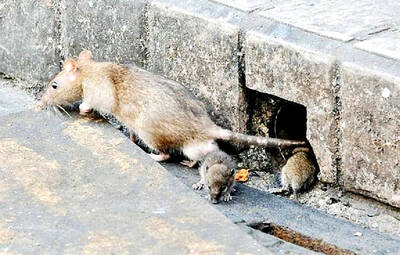As more tea store chains became embroiled in a pesticide scare, food safety specialists yesterday urged the public to refrain from drinking tea made from a first infusion and demanded the government step up its monitoring of pesticide use in edible products.
“There are about 70 types of environmental hormones. Among them, about 40, including dichloro-diphenyl-trichloroethane [DDT], dioxin-like polychlorinated biphenyls and plasticizers, can impede proper hormone function; increase the risk of cancer and birth defects; and cause the feminization of mammals, fish and birds,” Academia Sinica vice president Chen Chien-jen (陳建仁) told a forum on battling cancer in Taipei.
Chen said that long-term consumption of beverages made from pesticide-laced tea leaves could increase the risk of cancers. He urged the government to improve monitoring of tea farmers’ use of pesticides, and called on consumers to opt only for stores whose ingredients are proven by inspections to be free of pesticide residue.
Research has associated exposure to environmental hormones with higher risks of breast, ovarian, prostate, testicular and thyroid cancers, Chen said.
“It is worth noting that plasticizers can make one more prone to developing breast cancer, so the public is advised to avoid heating foods covered with plastic wrap in a microwave oven, regularly replace plastic containers with new ones and only put containers made from transparent glass or ceramics in a microwave,” he said.
Tan Tun-tzu (譚敦慈), widow of toxicology expert Lin Chieh-liang (林杰樑), said she conducted an experiment in which dried rose and chrysanthemum buds were first washed with cold running water for two minutes before being immersed in boiling water for three to five minutes.
“The result was that more than 90 percent of the pesticide residue contained in the buds was washed away,” Tan said.
People should not drink tea made from a first infusion to avoid consuming high levels of pesticide residue and stay away from tea leaves contaminated with DDT, as it is not water-soluble and is therefore harder to wash away, she said.
DDT was the insecticide found last month in the rose tea ingredients used by tea chain Stornaway (英國藍), a discovery that set off a nationwide pesticide scare that has widened to several other chains.

The manufacture of the remaining 28 M1A2T Abrams tanks Taiwan purchased from the US has recently been completed, and they are expected to be delivered within the next one to two months, a source said yesterday. The Ministry of National Defense is arranging cargo ships to transport the tanks to Taiwan as soon as possible, said the source, who is familiar with the matter. The estimated arrival time ranges from late this month to early next month, the source said. The 28 Abrams tanks make up the third and final batch of a total of 108 tanks, valued at about NT$40.5 billion

A group from the Taiwanese Designers in Australia association yesterday represented Taiwan at the Midsumma Pride March in Melbourne. The march, held in the St. Kilda suburb, is the city’s largest LGBTQIA+ parade and the flagship event of the annual Midsumma Festival. It attracted more than 45,000 spectators who supported the 400 groups and 10,000 marchers that participated this year, the association said. Taiwanese Designers said they organized a team to march for Taiwan this year, joining politicians, government agencies, professionals and community organizations in showing support for LGBTQIA+ people and diverse communities. As the first country in Asia to legalize same-sex

MOTIVES QUESTIONED The PLA considers Xi’s policies toward Taiwan to be driven by personal considerations rather than military assessment, the Epoch Times reports Chinese President Xi Jinping’s (習近平) latest purge of the Chinese People’s Liberation Army (PLA) leadership might have been prompted by the military’s opposition to plans of invading Taiwan, the Epoch Times said. The Chinese military opposes waging war against Taiwan by a large consensus, putting it at odds with Xi’s vision, the Falun Gong-affiliated daily said in a report on Thursday, citing anonymous sources with insight into the PLA’s inner workings. The opposition is not the opinion of a few generals, but a widely shared view among the PLA cadre, the Epoch Times cited them as saying. “Chinese forces know full well that

An elderly man with underlying health conditions died in mid-January, eight days after the onset of symptoms, marking Taiwan’s first hantavirus death this year, the Centers for Disease Control (CDC) said yesterday. The man, who was in his 70s and lived in Taipei’s Daan District (大安), tested positive posthumously for hantavirus after passing away on Jan. 13 from sepsis complicated by multiple organ failure and pneumonia, the CDC said in a press release. According to the CDC, the man sought treatment on Jan. 6 for respiratory issues and low blood pressure before returning two